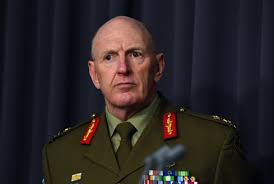
Ever since the mournful face of General Frewen first appeared in the media as the face of the person in charge of the logistics, rolling out the various weapons to curb the spread of the virus, I have had my doubts. He always seems to announce that there is plenty of something or other or announces it’s here or it’s imminent; and then there is an inevitable disconnect, some of which is salvageable at some point.
However, the impression is that of a man in khaki sitting on a pile of chaos.
The Prime Minister has found a new catchphase of “pushing through” to cover the lack of direction. Like so many of Morrison’s catchphrases, it lacks any objective meaning. The Prime Minister compares his nebulous phrase with “lockdown”. I know what Lockdown means, and I know what selective lockdown means. But “pushing through”? I ask you. How is that measured?
For me, I have tolerated Frewen until, when asked about the lack of organisation of the children’s inoculations, he replied well, go and out and source a doctor or pharmacist.
I thought of the General in a conventional warfare situation telling his troops after the invasion has started to go and find a gunsmith or boomerang carver to source their weapons.
Now, the kids are going back to school, and they could be faced with an essay question.
“General Frewen is incompetent and should be replaced. Discuss.”
The Greater Novak
The Greater Serbian ideology epitomises the nexus between religion, mythology and political thought. The establishment of Messianic ideology (Third Rome ideology), disseminated from Imperial Russia all over the Orthodox world, found fruitful ground in Serbia during the nineteenth and twentieth centuries. This ideology has been attributed to the rise of fanaticism and hostility toward others.
Serbia injected itself into WW1 when a member of one of its secret societies, The Black Hand, Gavrilo Princip by name, an 18 year old student, assassinated the Grand Duke Ferdinand and his wife, Sophie, in Sarajevo on 28 June 1914. This is generally regarded as one of the incidents which lit the flame of WWI. From Belgrade’s perspective, this War was the Third Balkan War. The First Balkan war in 1912 against the Ottoman Empire saw Serbia gain control of Kosovo, while the Second in 1913 saw Serbia defeat Bulgaria. These victories fed the aggressive aspects of a deep-rooted Greater Serbian ideology. The intertwined Orthodox church sense of superiority shared between the two major Slavic powers in Russia and Serbia emboldened the Serbians to take on the Austro-Hungarian empire.
Despite the collapse of the Russian Imperium, the Serbians came out the winners at the Conference at Versailles, with a Serbian king presiding over the new country of Yugoslavia, having also acquired both Croatia and Slovenia, plus, the predominantly Muslim Bosnia. This lasted until Germany invaded the Balkans in 1941.
Therefore, this new nation, sandwiched between the ruins of two empires in which they had been on the winning side, fulfilled the Serbian nationalist aims – at least to some degree.
In a demonstration of the underlying animosities in the World of the Racquet, at a time when Djokovic was probably acquiring his first racquet, the Croatian tennis player, Goran Ivanisevic had criticised Serbian-born Monica Seles, the top-seeded woman. Her “crime” was not disassociating herself from Yugoslavia and he said if they each won the Wimbledon titles, he would not dance with Seles at the traditional ball which follows. This was in 1992 at a time when the Serbs and Croatians were warring in the Balkans, in an ill-conceived venture by the Serbs, under Slobodan Milošević, to restore the Greater Serbian mystique, which Tito had destroyed by the end of WW11. The irony was that Seles was an ethnic Hungarian by accident born in Serbia.
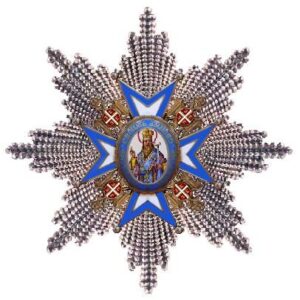
Djokovic is the archetypical Serbian authoritarian nationalist with the beautiful Serbian wife, two kids – and even at 34, the parents, not him, are there for Novak, directing the media storm in Serbia. His parents were actually born in Kosovo, and he has donated US$100,000 to the Gracanica Orthodox monastery there, for which he has been awarded the Order of St Sava.
Kosovo is only 1.5% Serb, and the rest are mainly Albanian, and hence the religious divide which drives into the position that Kosovo should be part of Serbia. A bit like Australia where the Serbs number about 20,000 across Australia, but then they can cause commotion more than any other.
His tennis mastery and his standing in his own country is such that when he feels that his exalted status is violated, then it is a situation which not surprisingly has generated this response, especially as his courtiers in Tennis Australia had obviously reassured him that they had fixed up a deal.
The problem is that Serbian nationalism knows no bounds, it travels from generation to generation, through its Orthodox church reinforcing this view, and worse still it is the Orthodox Christmas when this Christ simulacrum has been imprisoned in a “Carlton mangy”.
Djokovic is a poster boy of the anti-vaxxers, which is one of the many faces of the wild conspiracy theorists, intent in turning the world into raging paranoia, where the legacy of mediaeval myths borne of ignorance are translated into a modern day framework. Djokovic fits into this milieu as Trump does in his, completely selfish. All Djokovic wants is to win more Grand Slams than anyone else, and Melbourne has been his favourite surface. Nothing else matters, but because of his stance on vaccination he finds that us Australians find his attitude offensive. Thus, he sought to confuse by not declaring his status until forced.
But then let me get a piece of this conspiracy belief. Do not underestimate the existence of underground anti-vaxxers everywhere, including within Tennis Australia wishing to collaborate. Why do we have the panels of anonymous doctors delivering a secret judgement on Djokovic? As Margaret Thatcher would say: “Tell me their names.” Their qualifications? Doctors? Of Music?
Unanimous decision, was it? The questions are endless if you want to pursue a conspiracy. Why not invoke the Masons or any other secret society like the Melbourne Club? Once the community starts being secretive over something that, if revealed, only shows a level of poor judgement if nothing else where does it end? But wait a minute, two panels are supposed to be independent. So that cancels out bias?
Anyway, the level of paranoia is stoked in the community over a selfish, self-absorbed man who has a clear agenda, to win more Grands Slam tournaments than anyone else and it is in Melbourne, on a court surface where he reigns supreme. Does anyone seriously consider that this is not a ploy to guarantee him entrance to Australia over the new two years or so; and in addition to remain the poster boy of the anti-vaxxers and their tribe of “the mad and the bad”?
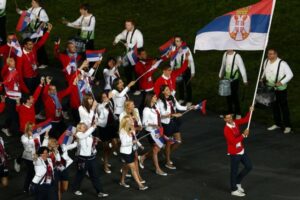
What’s a few days building up the myth of martyrdom in that Carlton cesspit, where maggots and cockroaches reign supreme and asylum seekers approach a decade of imprisonment.
It seems he has achieved a Pyrrhic victory on a pile of “alternate facts” he supplied. The “porkies” seem to be growing into a full-blown sty.
Would you want to be at Rod Laver Arena with the stands stacked with the Greater Serbia brandishing the icon of the Christ figure, Novak when Mr Nadal is on the court? He may as well be a Croatian. Welcome to the Balkans on the Yarra with or without the Serbian Tennis Christ. I ask you!
But yesterday the Washington Post’s sober assessment may stick.
It’s too bad Australia didn’t stick to its rules and Victoria didn’t follow suit, given the success both realized from being sticklers to safeguards for much of the past two years. Those regulations should extend to everyone, athletes and those around them included.
Some Holiday reading. An Excerpt from my forthcoming novel – “The Scars of 56”
Eventually, a few days before Christmas, we set sail for Japan.
One bright sunlit day before Christmas, I was leaning on the rail watching the sea wash beneath the ship. My father had come up from his morning sick parade and found me. He said that I could probably make out the islands of Quemoy and Matsu on the horizon. I struggled to believe that those smudges on the horizon were islands and not clouds, and nobody had binoculars for us to confirm. I looked keenly towards where my father was pointing.
“It is strange how a couple of specks off the Chinese coast held by Chiang Kai-shek’s mob could cause so much trouble.” The Chief had materialised from the bridge. “Am I wrong or are those the islands?” The Chief nodded in response to my father’s query. “Aren’t we a bit close?” “No, we’re in the shipping lane.”
The last word was drowned out by the sound of two United States Air Force fighters passing just above mast height. They were past the ship before we could properly focus. These pieces of silver machinery with the star insignia had become specks in the distance, leaving behind a shard of noise. I thought it pretty exciting. They were Starfighters and they banked sharply and climbed upwards, then flattened out before turning, and then they were back on a strafing run again.
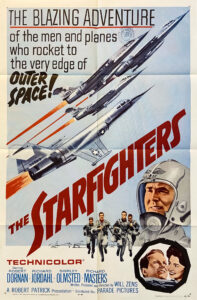 The Chief, having recovered from the initial surprise, had reached into his pocket in a studied way to produce his pipe and tobacco pouch. It was his reaction to what he saw as evidence of American bravado. By this time, the deck had filled with a few more passengers wondering what on earth was happening.
The Chief, having recovered from the initial surprise, had reached into his pocket in a studied way to produce his pipe and tobacco pouch. It was his reaction to what he saw as evidence of American bravado. By this time, the deck had filled with a few more passengers wondering what on earth was happening.
For a boy who had been brought up on comic book air force heroics and images of war where people scattered in the face of strafing, my father’s studied expression was designed to calm. He also affected more interest in packing his pipe than being impressed by this show of “Yank airpower”. His was the face of the British Dominion – a powerful image in an increasingly powerless environment. His growl of “Yank airpower” more cattle dog than bulldog.
He bit on his pipe stem with a face of disapproval.
Most of those on deck instinctively went for cover leaving my father, the Chief and me still against the ship railing, disinterested spectators in this show of American muscularity. This time we could see the outline of the masked pilots’ faces as they came low, parallel at mast height and then swerved away and were gone. I found myself waving; Gay just looked upwards.
“Useful training exercise. Getting their hours up. Terrorising the shipping. It is always good to know how defenceless guinea pigs really are,” murmured the Chief as those on deck broke into excited chatter.
“How exciting!” said Gay’s mother, which was about the sum of the passengers’ comments. Of course, it provoked a discussion at the dinner table that evening. Despite an unwritten protocol about not discussing religion or politics at the table, my father for once joined in the discussion.
It was impossible to ignore the buzzing of the ship by the American planes. However, somebody said that they were probably worried that we might be heading for a Chinese port, and just wanted to see who we were. This prompted talk of the future of China. Since nobody seemed to know much, the discussion about the exiled Chinese government on Formosa and, among the older of the gathering, the Chiang Kai-sheks, resurfaced. They were their type of Chinese, Madame Chiang being Western-educated, the ones that made them feel comfortable.
Weren’t they in the same category as all the other world leaders who had seen us through the war? Good people. But hang on, said one, Stalin had been a dreadful creature; and yet for a time he was spoken about as “Uncle Joe”. The Chief looked up and said wryly that was what the Americans called him when they wanted their people to think of him as benign and kind, like the Americans’ Uncle Sam. He tapped his pipe on the ashtray and went back to the bridge.
The conversation continued. The general consensus was that the Chiang-led government was still the upholder of Western democracy and thus worthy to be considered the legitimate Chinese government. The Communists were still usurpers, (really how could you abide them!) but nobody around the table really knew much about this Mao Tse Tung, although his Foreign Minister (or was it Prime Minister?) seemed to be a bit more personable.
“Chou-en-lai, that’s his name, isn’t it?” When asked, the voice that had said “he seemed personable enough” conceded that the judgement was made on seeing him smile on a newsreel. And one of the other passengers who obviously did not care much for “the chinks” said so. That seemed to stifle any further discussion.
As quickly as the topic had been raised, the discussion vanished into the cloud of cigar smoke. Nobody could think of anything more useful to say.
The status of the bridge games replaced the American plane incident. This was a conversation about something more familiar, and the passengers became rapidly engrossed in the finer details. At this stage my father excused himself. He did not like card games.
He looked around for someone with whom he could share a whisky. He would involve me when it meant saying how well I was doing at school – or had been doing at school. He had taken to announcing that there could be only one career for me and that was in medicine, or he might soften my potential fate by conceding I could at least have a career that involved the technological advances that he saw sweeping the world. My mentions of an interest in law and history were dismissed as a passing phase of youth.
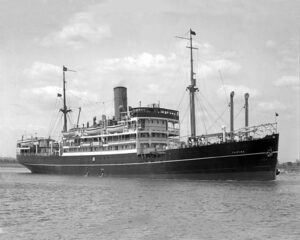
My father’s conversation reflected his fascination not only with China but also with Japan, Russia and the United States. However, he brushed away any interest in the culture. Not for him any chinoiserie artefacts or fine arts. Just as Hong Kong represented cheap suits and shirts, the prospect of Japan was cheap cameras, watches, Super-8 cameras and any other gadget that took his fancy. On the previous voyage he had purchased a kimono for my mother. She took one look at it and put it away in the back of the cupboard where it stayed. As for Russia, he was always talking about going across Russia by train – he wanted to travel the Trans-Siberian Railway.
At a time when there were still US currency restrictions in Australia, he managed to subscribe to the Saturday Evening Post and my mother had received the Ladies’ Home Journal from the United States. The subscription to the Saturday Evening Post reflected the high regard that he had for Benjamin Franklin, whose bust constantly appeared in the journal and whose Pennsylvania Gazette was said to be its direct ancestor.
But here we had been treated to an American show of force in the way the American planes had appeared without warning; so different from the hokey images of Norman Rockwell’s cover illustrations for the Post.
The Summer of 42
A musica da minha vida, a mais linda. Como e bom amar e ser amado.
I have written in a previous blog about the opening scenes in my favourite films, on the grounds that when I watch them they evoke situations in which I wish I had been “a player”. In the tapestry woven by each of the films, for instance I would have like to have been identified in the Tapestry as a 20 year old aspiring Truman Capote standing on the corner when Holly got out of the yellow taxi. As I look back, do I remember in real life my Holly Golightly? Well yes, I do.
But this is about the most memorable ending to another film, and for me, the young bloke, Herman Raucher, sitting for a moment on this seemingly unending New England beach among the tufts of littoral vegetation – amid the daub of daisies. Summer is just about spent. The film was The Summer of 42. The background was Nantucket Island.
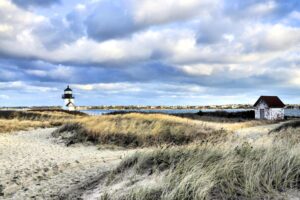
He had just seen the envelope with his name she had posted on the door of her summer rental. The beautiful cheerful young woman who was in her twenties and he a kid of perhaps sixteen or seventeen. She had dropped her guard the previous evening and they had made love. Why, is never clear – but he had continually watched and hung around her over the languid course of that summer. He had watched her farewell her soldier boyfriend, and thus alone she had drifted. Then there was the sexual encounter. When you dissect the film frame by frame it does not make sense. And yet in considering the entirety of the film, there was an inevitability of the autobiographical.
That morning after, he sits down on the porch seat and reads it.
Dear Hermie, I must go home now. I’m sure you’ll understand. There’s much I have to do. I won’t try and explain what happened last night, because I know that in time, you’ll find a proper way in which to remember it. What I will do is remember you. And I pray that you be spared all senseless tragedies. I wish you good things, Hermie. Only good things. Always, Dorothy.
The scene then switches to the boy on the beach, the boy walking away from the beach, narrating as he goes as the adult, counterpointing his awakening experience with Dorothy with the prosaic happenings to his friends.
I was never to see her again. Nor was I ever to learn what became of her. We were different then. Kids were different. It took us longer to understand the things we felt. Life is made up of small comings and goings. And for everything we take with us, there is something that we leave behind. In the Summer of ’42, we raided the Coast Guard station four times, we saw five movies, and had nine days of rain. Benji broke his watch, Oscy gave up the harmonica, and in a very special way, I lost Hermie. Forever…”
As I sit in my study, gazing out over the wrought iron balcony across the frangipani in flower to the Parramatta River 65 years later, I remember my version – my experience of the older woman and the younger man. There are none of the accompanying lush sounds of Michel Le Grand. Just the fragrance of the flowers. But my experience, although at one point close, never crossed the line – strange as that may seem today.
Yet the end of that film, which I first saw not long after its release in 1971, has lived with me. I never saw the heroine other than through my eyes, but they were those of an experienced man in his early thirties, not of the youth of 1956.
The film provided a prop for my thoughts to stray, still with the young New Zealand woman on the ship, and the first words of Herman’s epilogue, which were so very true.
I never did see Gay again, but as I have written in my book, her parents did communicate with my father a couple of times in friendly terms. Yet I never did. I was not to go to New Zealand where she lived, until the end of 1984. Then I did not try and make contact. It was too long past.
In the 1950s, she may as well have lived on the moon so distant was New Zealand and as we did not play much rugby union in Victoria, and certainly not at an international level, maybe the moon was too close.
And moreover, she was a Roman Catholic and if my mother had still been alive, association with “a Papist” would have been very much a no-no. That fact had come as a surprise to me and I make no mention of this in my book. The assumption was that all New Zealanders were either Anglicans, or more likely Presbyterians. Nothing like growing up in a culture of stereotypes.
But even as some years on, I still remember the summer of 56, even with the scar tissue.
The Wrong Smoking Ceremony
I felt both angry and sad when I read about the fire on the portico of Old Parliament House. It was supposed to be a smoking ceremony. For God’s sake, what was this meant to be, apart from one of the meaningless acts on the fringe of Aboriginal culture. Like the didgeridoo, clap sticks, smearing ochre on one’s body, the welcome to country, it seems that Aboriginal culture has become a reflex rather than an appreciation of the diversity of the various tribes from one group to another as we whitefellas do when we invoke heritage.
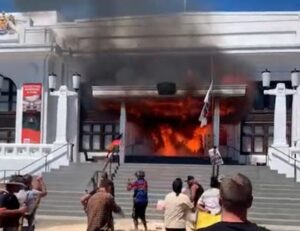 One could argue the tent embassy outside Old Parliament House has outlived its time. I was there, sitting around the campfire with Charlie Perkins in 1973, outside Parliament House. Charlie was not short on being able to handle the media. Ever since he had been involved in the Freedom Rides in the 1960s in country NSW, Charles had been very much the face of Aboriginal activism. He was brilliant in his use of symbolism, and the simple campfire outside Parliament House emphasised very much the traditional myth of Australian egalitarianism – mateship.
One could argue the tent embassy outside Old Parliament House has outlived its time. I was there, sitting around the campfire with Charlie Perkins in 1973, outside Parliament House. Charlie was not short on being able to handle the media. Ever since he had been involved in the Freedom Rides in the 1960s in country NSW, Charles had been very much the face of Aboriginal activism. He was brilliant in his use of symbolism, and the simple campfire outside Parliament House emphasised very much the traditional myth of Australian egalitarianism – mateship.
There was an aboriginal Liberal Party Senator at time, Neville Bonner, a Queenslander whose preselection was protected from the ravages of the National party by Eric Robinson, a person whose contribution as a true liberal to the Coalition was cut short by his premature death. The problem with Neville was that he was a nice bloke, as they say he “had his heart in the right place. He was not very intelligent, and although he presented a “small-liberal” face he was isolated from the young Aboriginal activists. His criticism of the “Embassy” did not help his standing. Unfairly but still deadly, he was a tagged as “a coconut”, black on the outside; white on the inside. He is quoted later in life saying that he felt very lonely in Canberra.
I was asked to make contact with Charlie Perkins, which I did, and we got on very well. A young Liberal staffer sitting around the campfire of the nascent embassy with Charlie moved one National Party Senator to ask rhetorically, “Who was that Communist staffer of the Leader of the Opposition sitting out there with Perkins?”
And there was another reason for a campfire. It’s bloody cold in the Canberra winter.
Over the years, I have wondered what has been the point of maintaining what resembles an outstation, without there being a consolidation of it as a permanent symbol. After all, Canberra is full of monuments – while not one there to celebrate those years of the rise of the Urban Aboriginal Power. Sometimes, when in Canberra I would go over, and find it empty. Reminded me of a bedroom when I was in student in College.
Smoking ceremony gone wrong was one reason for there being the fire at the Parliament House entrance. My dilemma is that these so-called smoking ceremonies appear not to be recorded historically. I have looked through a number of early accounts of observations of Aboriginal life and cannot find any mention. Nevertheless, when I asked a friend about it, he said it is a modern invention, adapted from other indigenous cultures which would have been unknown to the ancestors of Australian Aborigines. He has promised a contribution to the blog to recall its origin at La Perouse, nearly 30 years ago.
Anyway, the vision of the doors of Old Parliament House going up in flames did not give any indication of the Aboriginal expertise in the cold burn; and it was the fire brigade which extinguished the flames.
The tent embassy crowd tried to distance themselves from any involvement. But what the Aboriginal community should do is to set out the appropriate traditional way the smoking ceremony should be used and not debased.
What does Prince Rupert think?
Morrison saying people who test positive by rapid test should contact their own GP is not meaningful for many twentysomethings. Like telling them to contact their regular blacksmith.
Prince Rupert has commented(sic): Well, with respect to madam twitterata, my serfs used to go to the blacksmith with medical problems, even when rats were miasmic.
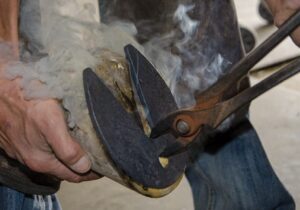
Well, in my bygone times, when general practitioners were thin on the ground in the country village, the farrier may have looked after the horses’ limbs but it was actually the blacksmith who set the fractured bones of the peasants when they were trampled by the farriers’ work.
Mouse Whisper
The Government, early in the New Year, sent rapid antigen tests to the Aboriginal Medical Services. Unfortunately, they were closed for Christmas. That bloody virus has no respect for anything, not even General Frewen.

